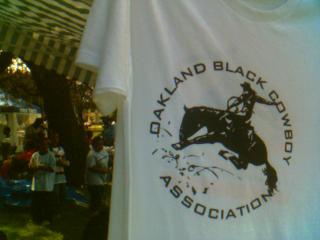Good food is the result of the passion of the people who love and work the land. Michael Ableman made this point well with slides of photos catalogued in his book
Fields of Plenty.

He talked about simple solutions, kids raised on kale, and families who have lived on the land for generations. He described grain share program for residents of San Francisco who buy whole grains—oats, wheat, millet, and the like—grown by a single farmer named Jennifer and some horses. Two of my favorite photos were of rooftop gardens in New York City and some wacky people who decided that a sheep dairy was a good idea. They make sheep cheeses that look like "moldy horse turds." Mmmm...horse turds. I also loved the images of black farmers who work with black farmers collectives. They drive their goods into Chicago for the
Austin Farmers Market in a neighborhood that doesn’t have a grocery store. There’s a
black farmers market here in West Oakland too, and of course, the
People’s Grocery which drives an organic grocery truck around West Oakland trying to heal food poverty one block of tofu at a time.

Ableman says that those who know how to coax food from the earth are true leaders. I believe that. The passionate, beyond-organic farmers that he described are leaders pointing a way to a new future. Another speaker,
David Orr, contended that ecological design points to two different futures: one, agrarian-based, simplified, and extremely local, and the other technological, prosperous, and fecund. I don’t see the conflict between the two. Why not build a world where there are small organic farms at the heart of every neighborhood, people work near where they live or telecommute frequently, mass transit provides comfortable and convenient transport, and the biological and technological ingredients of our world—from the plastics in our computer monitors to the toppings on our pizzas flow continuously in
separate cycles of reuse. Yeah, yeah, yeah, and why don’t we all just hold hands and sing. I type that with a sort of bitter sarcasm borne in the distance between utopia and reality, but there’s real power in song and
Bernice Johnson Reagon told us all about it at Bioneers. More on her later!
 He talked about simple solutions, kids raised on kale, and families who have lived on the land for generations. He described grain share program for residents of San Francisco who buy whole grains—oats, wheat, millet, and the like—grown by a single farmer named Jennifer and some horses. Two of my favorite photos were of rooftop gardens in New York City and some wacky people who decided that a sheep dairy was a good idea. They make sheep cheeses that look like "moldy horse turds." Mmmm...horse turds. I also loved the images of black farmers who work with black farmers collectives. They drive their goods into Chicago for the Austin Farmers Market in a neighborhood that doesn’t have a grocery store. There’s a black farmers market here in West Oakland too, and of course, the People’s Grocery which drives an organic grocery truck around West Oakland trying to heal food poverty one block of tofu at a time.
He talked about simple solutions, kids raised on kale, and families who have lived on the land for generations. He described grain share program for residents of San Francisco who buy whole grains—oats, wheat, millet, and the like—grown by a single farmer named Jennifer and some horses. Two of my favorite photos were of rooftop gardens in New York City and some wacky people who decided that a sheep dairy was a good idea. They make sheep cheeses that look like "moldy horse turds." Mmmm...horse turds. I also loved the images of black farmers who work with black farmers collectives. They drive their goods into Chicago for the Austin Farmers Market in a neighborhood that doesn’t have a grocery store. There’s a black farmers market here in West Oakland too, and of course, the People’s Grocery which drives an organic grocery truck around West Oakland trying to heal food poverty one block of tofu at a time. Ableman says that those who know how to coax food from the earth are true leaders. I believe that. The passionate, beyond-organic farmers that he described are leaders pointing a way to a new future. Another speaker, David Orr, contended that ecological design points to two different futures: one, agrarian-based, simplified, and extremely local, and the other technological, prosperous, and fecund. I don’t see the conflict between the two. Why not build a world where there are small organic farms at the heart of every neighborhood, people work near where they live or telecommute frequently, mass transit provides comfortable and convenient transport, and the biological and technological ingredients of our world—from the plastics in our computer monitors to the toppings on our pizzas flow continuously in separate cycles of reuse. Yeah, yeah, yeah, and why don’t we all just hold hands and sing. I type that with a sort of bitter sarcasm borne in the distance between utopia and reality, but there’s real power in song and Bernice Johnson Reagon told us all about it at Bioneers. More on her later!
Ableman says that those who know how to coax food from the earth are true leaders. I believe that. The passionate, beyond-organic farmers that he described are leaders pointing a way to a new future. Another speaker, David Orr, contended that ecological design points to two different futures: one, agrarian-based, simplified, and extremely local, and the other technological, prosperous, and fecund. I don’t see the conflict between the two. Why not build a world where there are small organic farms at the heart of every neighborhood, people work near where they live or telecommute frequently, mass transit provides comfortable and convenient transport, and the biological and technological ingredients of our world—from the plastics in our computer monitors to the toppings on our pizzas flow continuously in separate cycles of reuse. Yeah, yeah, yeah, and why don’t we all just hold hands and sing. I type that with a sort of bitter sarcasm borne in the distance between utopia and reality, but there’s real power in song and Bernice Johnson Reagon told us all about it at Bioneers. More on her later!


